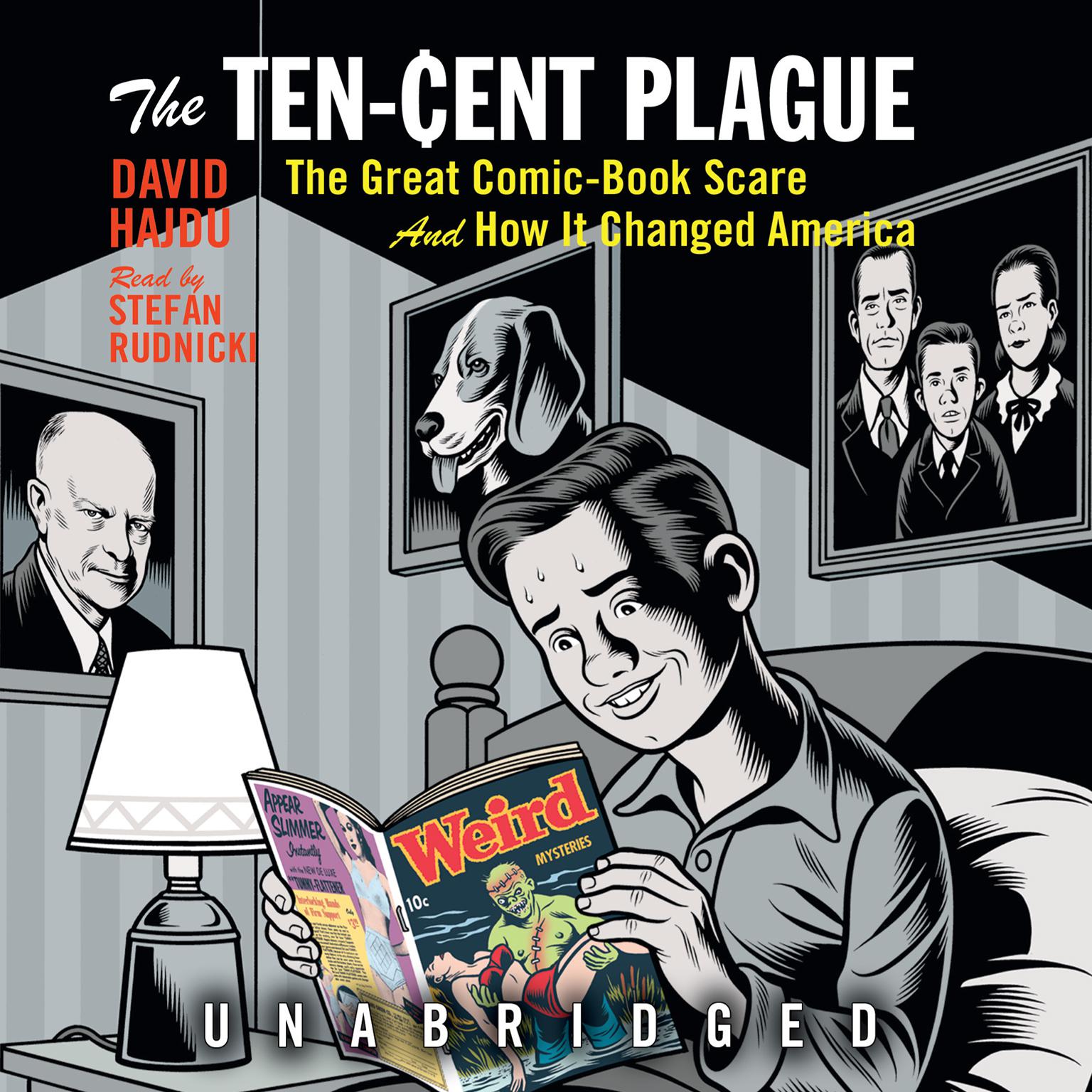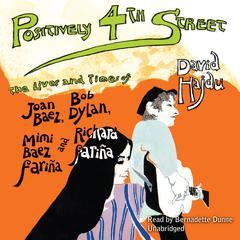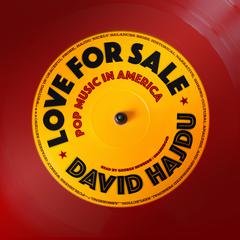 Play Audiobook Sample
Play Audiobook Sample
The Ten-Cent Plague: The Great Comic-Book Scare and How It Changed America Audiobook
 Play Audiobook Sample
Play Audiobook Sample
Quick Stats About this Audiobook
Total Audiobook Chapters:
Longest Chapter Length:
Shortest Chapter Length:
Average Chapter Length:
Audiobooks by this Author:
Publisher Description
In the years between World War II and the emergence of television as a mass medium, American popular culture as we know it was first created in the bold, pulpy pages of comic books. The Ten-Cent Plague explores this cultural emergence and its fierce backlash while challenging common notions of the divide between “high” and “low” art.
David Hajdu reveals how comics, years before the rock-and-roll revolution, brought on a clash between postwar children and their prewar parents. Created by outsiders from the tenements, garish, shameless, and often shocking, comics became the targets of a raging generational culture divide. They were burned in public bonfires, outlawed in certain cities, and nearly destroyed by a series of televised Congressional hearings. Yet their creativity, irreverence, and suspicion of authority would have a lasting influence.
Download and start listening now!
"An absolutely thrilling view of a little known aspect of the culture wars in the 1950s. Hajdu does a great job of giving the specifics of comic books, the artists, and their context, but also of connecting this community to the larger youth culture that is developing at the time, as well as the policing of thoughts and agency that was at work in politics and society as a whole. A very good book. I highly recommend it to anyone, even if you couldn't care less about comics."
— Devin (5 out of 5 stars)
Quotes
-
“Rudnicki’s steely narration of the Great Comic Book Scare of 1953–54 will raise the hackles of any freethinking American…The book is outstanding, even for those who don’t love comic books. Winner of the AudioFile Earphones Award.”
— AudioFile -
“Incisive and entertaining…This book tells an amazing story, with thrills and chills more extreme than the workings of a comic book’s imagination.”
— New York Times -
“To those who think rock ’n’ roll created the postwar generation gap, David Hajdu says: Think again. Every page of The Ten-Cent Plague evinces [Hajdu’s] zest for the ‘aesthetic lawlessness’ of comic books and his sympathetic respect for the people who made them.”
— Chicago Tribune -
“David Hajdu, who perfectly detailed the Dylan-era Greenwhich Village scene in Positively 4th Street, does the same for the birth and near death (McCarthyism!) of comic books in The Ten-Cent Plague.”
— GQ -
“Sharp…lively…entertaining and erudite…David Hajdu offers captivating insights into America’s early bluestocking-versus-blue-collar culture wars, and the later tensions between wary parents and the first generation of kids with buying power to mold mass entertainment.”
— Village Voice -
“A compelling story of the pride, prejudice, and paranoia that marred the reception of mass entertainment in the first half of the century.”
— Times Literary Supplement (London) -
“A vivid and engaging book.”
— New Yorker -
“Hajdu creates a colorful, character-driven story of our first real—and lasting—counterculture and shows why we embrace it still.”
— Amazon.com -
“Marvelous…A staggeringly well-reported account of the men and women who created the comic book, and the backlash of the 1950s that nearly destroyed it…Hajdu’s important book dramatizes an early, long-forgotten skirmish in the culture wars that, half a century later, continues to roil.”
— Entertainment Weekly (Grade: A-) -
“The Ten-Cent Plague is about the best account yet of comics in America, an instant classic of cultural history.”
— Geoffrey O’Brien, editor, Library of America -
“The main attraction—EC Comics publisher Bill Gaines’s attempt to explain in a Senate committee hearing how an illustration of a man holding a severed head could be in good taste—holds all the dramatic power it has acquired as it’s been told among fans over the past half-century.”
— Publishers Weekly (starred review)
Awards
-
Winner of the AudioFile Earphones Award
-
A 2008 San Francisco Chronicle Best Book for Nonfiction
-
One of the 2008 New York Times Book Review 100 Notable Books for Nonfiction
The Ten-Cent Plague Listener Reviews
-
" Comics controversy from Hogan's Alley in 1890s to censorship trials in 1950s. Critics saw superheros as fascists and sadists, romance comics as promiscuous, and thought that comics increased delinquency even though delinquency wasn't even rising at the time. Even the bible comics were believed to hurt children's eyes with their excessive colors. Eventually, being a comic book artist was equated with being a mobster. "
— Carolyn, 2/6/2014 -
" This should be made into a movie. If I could curl up inside the pages of this book and live there, I would. "
— Kristin, 1/26/2014 -
" Too dry and boring for this comic book fan. I couldn't even get past the first chapter. "
— Jacqueline, 1/22/2014 -
" A pretty complete history of the anti-comics movements in the 40s and 50s, tying in the Red Scare and Seduction of The Innocent. Focuses mostly on Bill Gaines and his EC Comics, since they were the originators of the Horror comic. Includes a frighteningly long list of the writers and artists who were driven from the comics industry, never to return. "
— Christian, 1/12/2014 -
" It's a great companion to any study of the red-scare in America and a fantastic history of comics, from crime, to romance and horror. "
— John, 1/9/2014 -
" Sounded great, but couldn't really get into it. Meh. "
— Vic, 11/18/2013 -
" Hajdu provides an outstanding history of American popular culture and postwar comics. "
— Hans, 10/31/2013 -
" this book was an interesting read, all about comic books in the 1950s and the way people used them as a scapegoat for all kinds of other things. it gets a bit repetitive. "
— Nina, 10/20/2013 -
" I was very disappointed in this book. I thought the overall premise was very interesting, given my own interests in comics, but the book is very dry and hard to get through. "
— Jtrain, 9/7/2013 -
" I think I would have enjoyed this book even more if I had had a better understanding of comics going into it, but instead I learned quite a lot about the history and development of the genre, along with frightening details of bannings and burnings. Important lessons here. "
— Angela, 4/11/2013 -
" interesting, incredibly detailed (sometimes too detailed) history of comic books. should be read in the voice of the comic book guy for the books on cd. "
— Emily, 6/17/2012 -
" Well written history of comic books and the comic book scare of the 50's. A little long in parts, though "
— Abby, 3/5/2012 -
" A good history of a troubled time. Great background for any comic reader. Only real criticism is that it got repetitive. The organization of the book was such that the same stories and anecdotes were rehashed a few times. "
— Jonathan, 11/13/2011 -
" Fascinating overview of the panic surrounding the advent of comic books. <br/>Parallels to current entertainment abound. "
— Spoffy, 5/21/2011 -
" Abandoned, sadly. There's clearly a fascinating story here, but it's laid out in a dense, haphazard, and tiring manner. Everything is given the same flat treatment, from the story of the first Superman comic to a warehouse owner's coat. Dull quotes sprinkled throughout for no discernible reason. "
— Neven, 4/9/2011 -
" Wonderful book -- well-written and very compelling story. Basically boils down to the death of EC Comics and the way the entire art form was forced to evolve after the damage was done. "
— Blake, 2/18/2011 -
" It read like more of an early history of comics, period, as opposed to a narrow history of the "scare" and did seem to wander off into too much detail on non-essential threads but still a very interesting story, worth being told. <br/> <br/> "
— Jeff, 2/4/2011 -
" I really enjoyed this book. It made me realize how interesting and important the comic book scare of the 50's was. I knew that it effected comic books but I did not realize that it was the the first of its kind. The censoring of a literature made for children.<br/><br/>A very good book. "
— Thedsm, 1/18/2011 -
" The title of the book says it all - a very academic look at the government’s war on comic books in the 1940s-1950s. Some things never change. "
— Jeff, 10/17/2010 -
" Fascinating and well-written history of comics. I enjoyed reading it greatly. "
— Vanessa, 6/21/2010
About David Hajdu
David Hajdu is the author of Lush Life and Positively 4th Street. He lives in Manhattan and writes for the New York Times Magazine, Vanity Fair, New Republic, and New York Review of Books.
About Stefan Rudnicki
Stefan Rudnicki first became involved with audiobooks in 1994. Now a Grammy-winning audiobook producer, he has worked on more than five thousand audiobooks as a narrator, writer, producer, or director. He has narrated more than nine hundred audiobooks. A recipient of multiple AudioFile Earphones Awards, he was presented the coveted Audie Award for solo narration in 2005, 2007, and 2014, and was named one of AudioFile’s Golden Voices in 2012.






